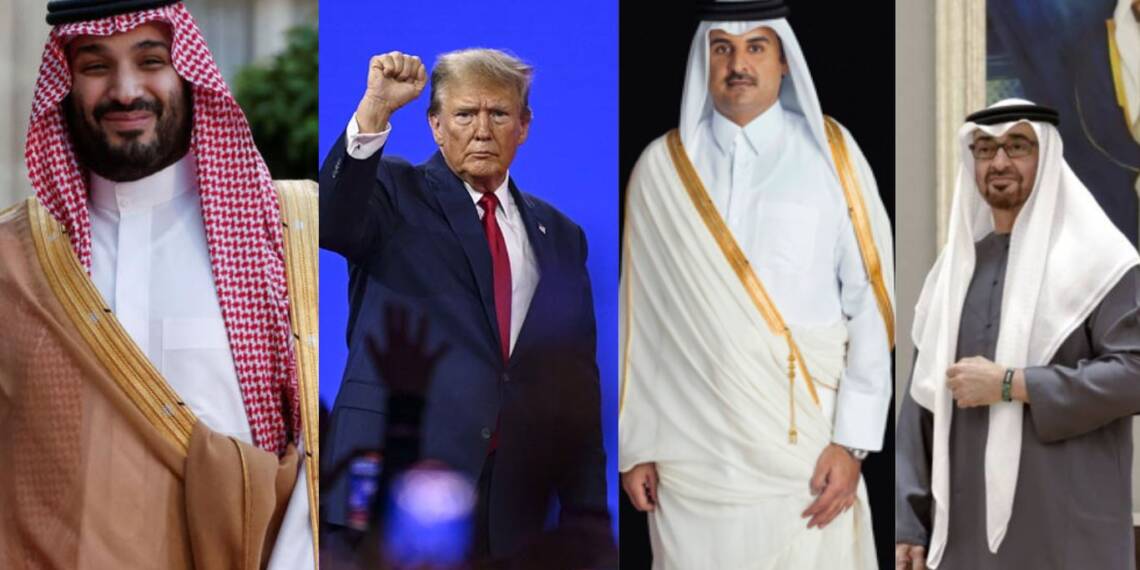During a landmark four-day tour of the Middle East, U.S. President Donald Trump visited three Gulf nations -Saudi Arabia, the United Arab Emirates (UAE), and Qatar, securing record-breaking deals and strengthening strategic alliances. His visit marked a crucial moment in U.S.–Gulf relations, with massive investments, defense agreements, and cooperation in artificial intelligence and energy shaping a new era of partnership. Let’s dive into what exactly these nations gained during Trump’s visit.
United Arab Emirates: $1.4 Trillion AI Investment
The most eye-catching announcement came from the United Arab Emirates, which committed to investing a staggering $1.4 trillion in the U.S. artificial intelligence (AI) sector over the next decade. According to the White House, the deal will allow the UAE to build, finance, or invest in data centers in the U.S. that are at least as large and powerful as those in the UAE. These facilities are essential for developing cutting-edge AI models and technologies.
Although the specific AI chips to be used were not disclosed, the presence of Nvidia CEO Jensen Huang with UAE President Sheikh Mohamed and Trump suggests that leading U.S. technology firms will play a role. The agreement symbolizes a deepening technological partnership and highlights the UAE’s ambition to become a global AI powerhouse.
Qatar: Defense Deals and Aviation Orders
Trump also visited Qatar, becoming the first sitting U.S. president to do so since 2003. Speaking at the Al Udeid Air Base near Doha, he praised Qatar for its role as a strategic ally, particularly in the energy sector and diplomatic efforts, such as hosting the U.S.-Taliban talks and housing the Afghan embassy.
Qatar signed a range of agreements with the U.S., including a defense deal worth $42 billion and a major order by Qatar Airways. The airline committed to purchasing 210 aircraft, valued at approximately $96 billion. Earlier estimates by Trump mentioned over 160 Boeing aircraft worth more than $200 billion, but final figures later clarified by the White House pegged the deals slightly lower. The purchase will boost the Qatar Airways industry as they are known for their air services around the world.
Overall, the agreements with Qatar are expected to generate about $1.2 trillion in economic activity. These deals are part of Qatar’s strategy to strengthen its military capabilities and compete economically with regional rivals like Saudi Arabia and the UAE.
Saudi Arabia: Military and Technology Partnerships
In Saudi Arabia, Trump was welcomed with high honors, and the visit resulted in one of the largest weapons deals in history. Saudi Arabia agreed to buy $142 billion worth of U.S. arms as part of a broader $600 billion investment plan in the United States. The agreement includes collaboration in energy, mineral development, and artificial intelligence.
In particular, Saudi Arabia pledged $20 billion for energy infrastructure and AI-focused data centers in the U.S. This aligns with the kingdom’s broader vision to become a global leader in AI and advanced technology. The deal highlights Saudi Arabia’s effort to diversify its economy and reduce reliance on oil through massive investment in emerging industries.
A White House fact sheet described the agreements as “historic and transformative,” marking the beginning of a “new golden era” of U.S.–Saudi relations.
A New Chapter in U.S.–Gulf Relations
President Trump’s visit to the Gulf was not just about signing deals—it represented a significant shift in strategic ties. Each country achieved key national goals:
- The UAE secured a technological edge with access to leading AI infrastructure.
- Qatar gained recognition as a strategic U.S. partner and enhanced its defense and aviation sectors.
- Saudi Arabia reinforced its military capabilities while pushing forward its AI and energy ambitions.
The trip underscored the growing role of technology and defense in Gulf–U.S. partnerships. With over $3 trillion in combined agreements, Trump’s visit left a lasting impact on the region’s geopolitical and economic landscape. Gulf nations are in a hurry to change their dependency on oil and diversify their economy, keeping the future in mind. The deals signed during this visit will boost the economic vision of Gulf nations.








